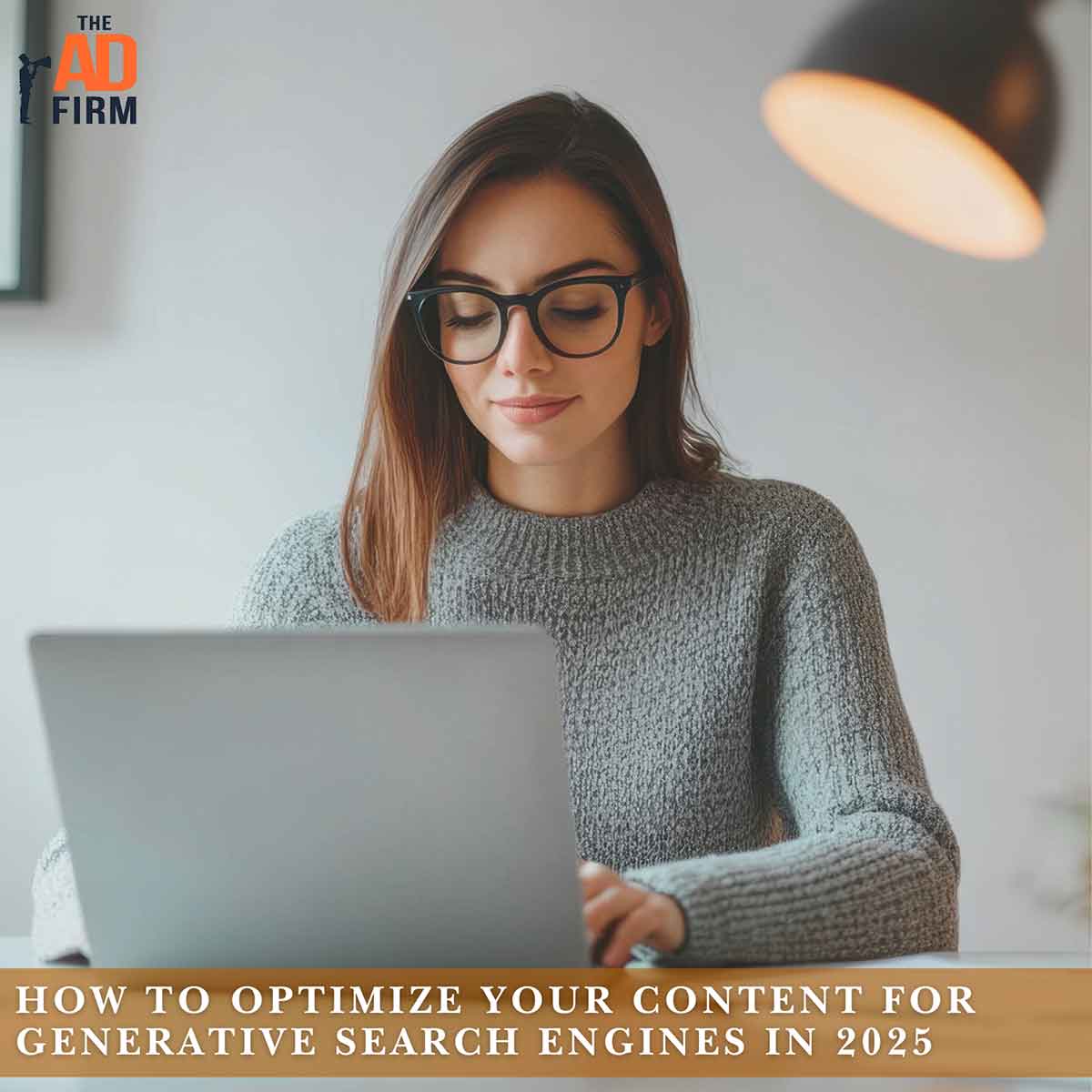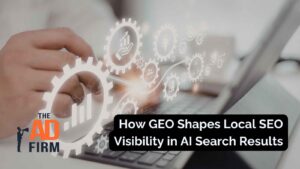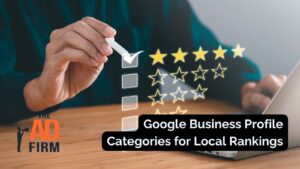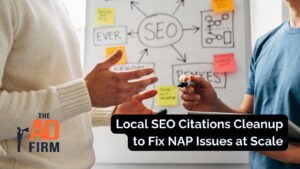The rules have changed. What worked in search last year won’t cut it today, and what barely works today will be obsolete tomorrow. Generative SEO is rewriting how content gets discovered, cited, and ranked. Google’s Search Generative Experience, ChatGPT’s search capabilities, and AI-powered answer engines are fundamentally altering how your potential customers find information.
If your content strategy hasn’t evolved to meet this shift, you’re not just falling behind; you’re becoming invisible. The businesses winning online visibility right now understand that adaptation isn’t optional.
Your competitors are already implementing strategies that keep their content visible, quotable, and authoritative when AI systems are doing the searching. The question isn’t if you should optimize for AI search engines, but how quickly you can start.
Understanding Generative AI Search in 2025
The search landscape has undergone a complete transformation. AI-powered search engines no longer match keywords to pages and rank results based on traditional signals. They synthesize information across multiple sources, generate comprehensive answers, and present users with complete responses before they ever click a link.
This fundamental shift means that businesses relying solely on conventional SEO tactics are watching their organic traffic evaporate while their competitors dominate AI-generated results.
How AI Search Engines Synthesize Information
AI search engines process queries differently from their predecessors. When someone searches for information, systems like Google’s SGE or ChatGPT don’t just retrieve pages. They understand context, extract relevant information, and create original responses. These engines analyze your content’s structure, verify claims against multiple sources, and determine which information deserves citation.
Your content must be structured so that extraction is effortless for AI systems. Think of AI search engines as sophisticated researchers conducting literature reviews. They scan for clear thesis statements, supporting evidence, proper attribution, and logical flow.
Key elements AI systems prioritize:
- Clear, declarative opening statements
- Supporting evidence within the first 100 words
- Logical content hierarchy with descriptive headers
- Verifiable claims with proper sourcing
How is AI Changing SEO in 2025?
AI has fundamentally altered the search ecosystem. Search engines now generate direct answers instead of merely listing links to web pages. This means your content competes not for clicks but for citations within AI-generated responses.
Transform Your Online Strategy with The Ad Firm
- SEO: Achieve top search rankings and outpace your competitors with our expert SEO techniques.
- Paid Ads: Leverage cutting-edge ad strategies to maximize return on investment and increase conversions.
- Digital PR: Manage your brand’s reputation and enhance public perception with our tailored digital PR services.
The metrics that matter have changed. Page views and bounce rates take a backseat to citation frequency and answer inclusion rates. Digital marketing services that understand this shift focus on making content extraction-friendly rather than optimizing solely for click-through rates.
Why Keyword-Only Strategies Fall Short
Keyword stuffing never worked well, but now it actively hurts your visibility. AI favors semantic and topic-cluster coverage over mechanical keyword repetition. These engines prioritize semantic relevance, topical authority, and comprehensive coverage over exact-match keywords.
The alternative isn’t abandoning keywords; it’s integrating them naturally into genuinely valuable content. Modern AI SEO agency approaches focus on topic clusters, semantic relationships, and entity recognition. Your content should thoroughly cover topics, using varied terminology and related concepts.
ALSO READ: The Marketer’s GEO Checklist: 7 Steps to Improve Your AI Search Visibility
Creating Intent-Focused, AI-Ready Content
Content creation has become more strategic and less mechanical. You can no longer publish thin articles targeting specific keywords and expect results. AI search engines evaluate content depth, accuracy, and usefulness before considering it citation-worthy.
How to Optimize Content for Generative AI?
Optimizing for generative engine optimization starts with understanding what AI systems value: clear, authoritative, well-structured information that directly addresses user queries. Every page should have a clear purpose and deliver on that purpose immediately, with the most essential information presented first.
Start by auditing your existing content through an AI lens. Does each page answer a specific question comprehensively? Can AI systems quickly identify and extract your main points without parsing through unnecessary preamble or navigating unclear hierarchy?
Essential optimization elements:
- Immediate answers to primary questions
- Supporting details are organized logically
- Clear information hierarchy
- Scannable formatting with headers and short paragraphs
Writing for Natural Language Queries
Natural language optimization means writing how people actually speak and ask questions. Voice search and conversational AI have dramatically changed query patterns. Users ask complete questions rather than typing fragmented keywords.
Enhance Your Brand Visibility with The Ad Firm
- SEO: Enhance your online presence with our advanced SEO tactics designed for long-term success.
- Content Marketing: Tell your brand’s story through compelling content that engages and retains customers.
- Web Design: Design visually appealing and user-friendly websites that stand out in your industry.
Structure your content around question-and-answer formats when appropriate. Use headings that reflect actual user queries. Write introductions that immediately address the core question before expanding into details. AI systems favor content that matches the conversational nature of modern search queries.
Leveraging Semantic SEO and Entity Recognition
Semantic SEO moves beyond individual keywords to related concepts, entities, and topics. AI systems understand relationships between ideas and recognize authoritative content that demonstrates topic mastery through comprehensive coverage. Your content should naturally incorporate related terms, address connected subtopics, and link to relevant authoritative sources.
Entity recognition helps AI systems understand what your content discusses. Explicit references to people, places, organizations, products, and concepts, with proper context, signal topical authority. Use structured data to identify entities when possible explicitly.
Local SEO services benefit particularly in this area. Proper entity markup helps AI systems accurately connect businesses with relevant local queries and geographic contexts. This creates stronger visibility in location-based AI responses.
Comprehensive Coverage Over Keyword Density
Comprehensive content outperforms keyword-optimized content in AI search environments. Rather than repeating target keywords, focus on thoroughly covering topics across multiple angles. Address common questions, misconceptions, alternatives, and edge cases.
This approach requires more research and effort upfront, but delivers significantly better results. Create content that becomes the definitive resource on your topic. Include data, examples, case studies, and practical applications. When AI systems evaluate sources for generating answers, comprehensive resources consistently win over surface-level keyword plays.
ALSO READ: AI for Multilingual SEO: Scaling Content for Global Reach
Structuring Content for Maximum Citations
Structure determines if AI systems can easily extract and cite your content. Even excellent information presented poorly gets overlooked. AI engines need clear signals about content organization, hierarchy, and relationships between ideas.
How to Optimize for Search Generative Experience?
Search Generative Experience demands content structured for both human readers and AI extraction. AI systems evaluate extraction quality based on how quickly they can identify authoritative statements, verify supporting evidence, and match content segments to specific user queries. Your pages need concise paragraphs that each make one clear point and formatting that highlights key information.
Streamline Your Digital Assets with The Ad Firm
- Web Development: Build and manage high-performing digital platforms that enhance your business operations.
- SEO: Leverage advanced SEO strategies to significantly improve your search engine rankings.
- PPC: Craft and execute PPC campaigns that ensure high engagement and superior ROI.
Implement consistent formatting patterns across your content library. Use short paragraphs (60-100 words) that contain complete thoughts. Start each paragraph with your main point, then provide supporting details. This inverted pyramid approach ensures that AI systems capture your key messages, even if they extract only the first sentence.
Creating 60-100 Word Citation-Ready Paragraphs
Citation-ready paragraphs function as standalone units of information. Each paragraph should make one clear point supported by evidence or explanation. When AI systems extract information to generate answers, they often pull individual paragraphs or sentences.
Write declarative opening sentences that state facts clearly. Follow with 2-3 supporting sentences that provide context or evidence. Keep paragraph length between 60-100 words, long enough to be substantive but short sufficient to extract cleanly.
Paragraph structure checklist:
- One main idea per paragraph
- Clear topic sentence at the start
- 2-3 supporting sentences
- 60-100 word total length
Using Question-Based Headings Effectively
Question-based headings align perfectly with how users query AI systems and how those systems organize information. When someone asks ChatGPT or Google’s AI a question, the system looks for content with headings that match or closely relate to that query. Your H2 and H3 headers should reflect actual user questions, not just descriptive labels.
Convert generic headings into specific questions. Instead of “Benefits of Mobile Optimization,” use “Why Does Mobile Speed Affect Search Rankings?” This approach helps both users scanning your content and AI systems matching queries to sources. Question-based headers create natural entry points for readers and clear extraction points for AI.
Formatting with Lists, Tables, and Bullets
Strategic formatting enhances both readability and AI extractability. Lists, tables, and bullet points organize complex information into digestible chunks that AI systems can easily parse and cite. Use these formats intentionally when presenting multiple related items, comparisons, or step-by-step processes.
Tables work exceptionally well for comparisons, specifications, or data presentation. AI systems can extract table data cleanly and present it in generated answers. Lists should present parallel items clearly; each point should be roughly equal in length and importance. An experienced AI SEO agency knows when to use each format for maximum impact without sacrificing content quality or natural flow.
Boost Your Business Growth with The Ad Firm
- PPC: Optimize your ad spends with our tailored PPC campaigns that promise higher conversions.
- Web Development: Develop a robust, scalable website optimized for user experience and conversions.
- Email Marketing: Engage your audience with personalized email marketing strategies designed for maximum impact.
ALSO READ: How to Build SEO Content That Matches User Journey Stages (TOFU, MOFU, BOFU)
Technical Optimization for AI Crawling
The technical foundation determines if AI systems can access, understand, and trust your content. Even perfectly written, comprehensive content fails if technical barriers prevent AI from crawling or understanding. Your site’s technical health directly impacts AI visibility.
How to Use Schema Markup for Generative Search
Schema markup encodes your content structure in machine-readable form that AI systems can process instantly. Structured data provides clear context that helps AI systems understand your content’s meaning, type, and relationships. Schema markup tells search engines what your content covers, who created it, when it was published, and how it connects to other information. Without structured data, AI systems must infer meaning on their own, which is slower and less accurate.
Implementing schema markup turns your content into semantically rich information that AI can easily categorize, understand, and cite. Article, FAQ, How-To, and Local Business schemas each serve a specific purpose depending on content type. Generative SEO relies on structured data to help AI determine content relevance and authority more effectively.
Schema implementation requires some technical knowledge but delivers measurable results. Start with foundational schema types such as Article, Organization, and WebPage. Then add specialized schemas based on your content type:
- Review schema for testimonials
- Product schema for service pages
- FAQ schema for Q&A content
- Local Business schema for city or location pages
Always test your schema using Google’s Rich Results Test and Schema Markup Validator to ensure there are no errors and that all key attributes are correctly represented. Many digital marketing clients see immediate improvements in AI-driven visibility after applying comprehensive schema markup.
Mobile Speed and Core Web Vitals
Page speed and user experience metrics directly affect AI search visibility. AI systems consider whether recommended sources provide a good user experience. Slow-loading pages, poor mobile performance, and frustrating layouts reduce your chances of being cited regardless of content quality.
Optimize images, minimize JavaScript, leverage browser caching, and use content delivery networks to improve load times. Mobile performance matters particularly because voice search and mobile queries drive much AI search behavior. Users asking AI systems questions on mobile devices expect fast, responsive experiences when they click through to sources.
Strengthen Your Online Authority with The Ad Firm
- SEO: Build a formidable online presence with SEO strategies designed for maximum impact.
- Web Design: Create a website that not only looks great but also performs well across all devices.
- Digital PR: Manage your online reputation and enhance visibility with strategic digital public relations.
Clean HTML and Accessibility Standards
Clean, semantic HTML helps AI systems parse content structure and meaning. Use proper heading levels (H1, H2, H3) to organize information logically. Avoid excessive div nesting, inline styles, or other code bloat that make content more complicated to extract.
Semantic HTML5 elements like article, section, nav, and aside provide additional context about the content’s purpose and organization. Alt text on images helps AI systems understand visual content. Descriptive link text provides context for relationships between pages. These technical details signal content quality and professionalism.
Building Authority and Tracking Performance
Authority determines which sources AI systems trust enough to cite. Building that authority requires demonstrating expertise, maintaining content accuracy, earning external validation, and proving ongoing relevance. You must establish your content as reliable enough for AI to recommend to users confidently.
What is the SEO Strategy for 2025?
The 2025 SEO strategy prioritizes becoming a definitive knowledge source in your industry. Build topic authority through layered resources: comprehensive content hubs with pillar pages supported by detailed subtopic articles. Each piece should demonstrate evident expertise through author credentials, original research, and verified data.
Focus on maintaining content accuracy and freshness. Establish systematic update schedules based on topic volatility. Earn external validation through mentions on authoritative platforms and quality backlinks. While traditional link building retains value, expertise signals and content comprehensiveness drive generative engine optimization success more effectively.
Authority-building priorities:
- Comprehensive topic coverage
- Regular content updates
- Clear author credentials
- External authoritative mentions
E-E-A-T Signals for Generative Search
Experience, Expertise, Authoritativeness, and Trustworthiness (E-E-A-T) have become critical for AI search visibility. AI systems evaluate these factors when determining which sources deserve citation. Clear author bios with relevant credentials signal expertise. Citations to authoritative sources demonstrate research rigor.
Display author information prominently with credentials that establish expertise. Link to authoritative sources when making claims. Show your work by explaining research methodology or testing processes. Update publication dates when content is refreshed. These signals tell AI systems your content comes through knowledgeable sources who prioritize accuracy.
Advance Your Digital Reach with The Ad Firm
- Local SEO: Dominate your local market and attract more customers with targeted local SEO strategies.
- PPC: Use precise PPC management to draw high-quality traffic and boost your leads effectively.
- Content Marketing: Create and distribute valuable, relevant content that captivates your audience and builds authority.
How Often Should I Update Content for AI?
Content freshness significantly impacts AI search visibility. AI systems favor recently updated content, particularly for topics that change frequently. Stale content gets deprioritized regardless of initial quality. Regular updates signal that your content remains current and trustworthy.
Create a content maintenance schedule based on topic volatility. Industry news and trend content need frequent updates. Evergreen how-to content requires less frequent revision but should still be reviewed regularly. Add prominent update dates so AI systems can recognize content freshness. Fresh content consistently outperforms stale content in AI-generated results.
Monitoring AI Search Visibility and Rankings
Tracking AI search performance requires new tools and metrics beyond traditional rank tracking. Monitor if your content appears in AI-generated answers, which sources AI systems cite when discussing your topics, and how often users click through to your site. Tools like Authoritas, SearchGPT tracking, and AI visibility monitors help measure performance in this new search environment.
Analyze which content formats and structures earn the most AI citations. Identify topics where you’re being cited versus those you’re overlooking. Track changes in AI visibility alongside traditional SEO metrics to understand your complete search presence. Use these insights to continuously refine your generative SEO strategy.
Transform Your Content Strategy for the AI Search Era
The shift to AI-powered search is complete. Businesses that adapted early are dominating visibility while competitors struggle to keep pace. You’ve learned the strategies: comprehensive content that answers user intent, citation-friendly formatting, technical optimization, and authority signals that establish expertise.
The Ad Firm specializes in AI SEO services that encompass everything covered in this guide: strategic content restructuring, technical optimization, authority building, and performance monitoring. Our digital marketing agency delivers measurable ROI through integrated strategies across SEO, PPC, and web design.
We’ve guided businesses through every significant search evolution, and AI-powered search is no different. Our local SEO services incorporate AI optimization tactics that help businesses appear in conversational search results.
Elevate Your Market Presence with The Ad Firm
- SEO: Boost your search engine visibility and supercharge your sales figures with strategic SEO.
- PPC: Target and capture your ideal customers through highly optimized PPC campaigns.
- Social Media: Engage effectively with your audience and build brand loyalty through targeted social media strategies.
We implement generative engine optimization strategies that position your content as the authoritative source that AI systems repeatedly cite. Stop watching competitors dominate AI search results. Contact The Ad Firm today to transform your content strategy and reclaim the visibility you’ve lost. Your market is searching with AI right now. Make sure they’re finding you.






